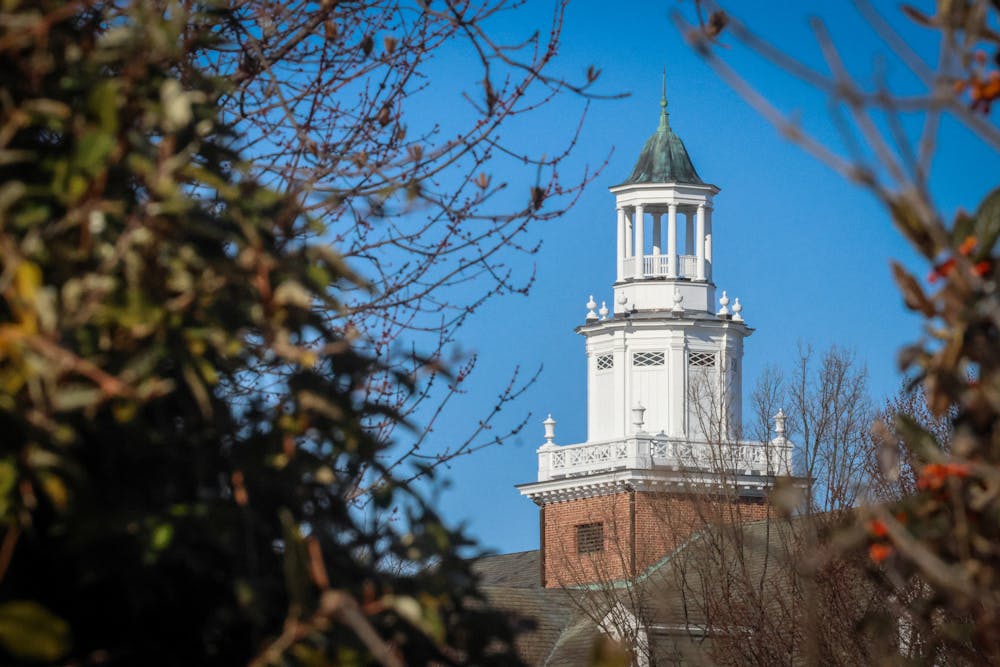Editor’s Note: This is a developing story and will be updated as more information becomes available.
April 12
As of April 10, the Office of International Services (OIS) stated that the number of graduate students who have had their F-1 visas and records revoked was now “several dozen” on their website, an increase from the “approximately dozen” described on April 8.
April 8
On Tuesday April 8, a university spokesperson confirmed that approximately a dozen Hopkins graduate students and recent graduates of Hopkins graduate programs have had their F-1 visa records terminated by the government through the Student and Exchange Visitor Information System (SEVIS) of the U.S. Immigration and Customs Enforcement in an email to The News-Letter.
“As the visa sponsor, the university has taken required steps to inform students of the terminations. The university is providing a range of support services to affected students through our offices of international services, academic advising, and health and wellbeing,” the spokesperson stated.
The spokesperson also stated that the University has not received any information about the specific basis for the revocations.
“We have no indication that the revocations are associated with free expression activities on campus. While visa revocations do require students to depart the United States, we are not aware of any arrests or detentions of Johns Hopkins students as a result of these visa actions,” the spokesperson stated.
In an email to The News-Letter, Teachers and Researchers United (TRU-UE), the graduate student union, shared that they received news on Sunday that the Department of Homeland Security has terminated the visas of several Hopkins international students.
The OIS website states that students can reach their office through the website or by email at ois@jhu.edu. Other guidance posted includes information on interacting with immigration enforcement officers.
“Our international community is very important to Johns Hopkins, and we remain committed to supporting all our students, faculty and staff. We share the serious concerns arising from recent changes in federal immigration policies and enforcement activities and understand the anxiety this instills in our community members and their families, here and abroad. We are working directly with affected students as noted below,” the website reads.
In light of this development and the recent graduate student detainments by Immigration and Customs Enforcement (ICE), TRU-UE stressed their disapproval of the University’s response.
“We are incredibly disappointed by the University’s lack of leadership and, frankly, cowardice in taking up a strong fight against a fascist, authoritarian federal administration in defense of our most vulnerable members,” a spokesperson for TRU-UE wrote.
The TRU-UE spokesperson added the University’s reliance on federal funding prevents their ability to protect the student body.
“With Hopkins’ recent memo asking faculty and staff to ‘not-intervene’ if ICE attempts to detain one of our own, the community is realizing that institutes like Johns Hopkins do not work in service of students or workers but they work in service of profit, and this is why they will always be willing to collaborate with the state, to not risk their funding for example” they wrote. “The form of protection we get from one another, from collectively rallying and organizing around the demands we seek, is what keeps us safe, not the university, and not the federal government.”
TRU-UE has contacted President Ronald J. Daniels, Provost Ray Jayawardhana, Vice Provost Sabine Stanley and the Director of OIS Dacia Gauer, among other OIS staff members, for more information to take action against the visa terminations.
While they acknowledged the limits of their union in protecting international students, they noted the importance of continuing to advocate for the Hopkins international community.
“We do not stop building worker power and leveraging our biggest tool, our labor, to win the protections we desperately need,” they wrote. “We do not allow fear to demobilize our movements at a moment when so much is at stake.”
Over 300 student visas have been revoked since the Trump administration’s crackdown on immigration enforcement. These include several students from Columbia University, Stanford University, Harvard University, Tufts University, the University of Massachusetts and multiple Universities of California. Reasons for visa revocations have not been publicly divulged.
In a statement to The News-Letter, a U.S. State Department spokesperson, stated that visa applicants and non-citizens who break or demonstrate an intent to break U.S. laws are subject to visa refusal, visa revocation and/or deportation. The spokesperson continued by stating that they lack exact statistics at this time, but they will continue working closely with the Department of Homeland Security to enforce immigration laws.
“As the Secretary indicated, the Department revokes visas every day in order to secure America’s borders and keep our communities safe -- and will continue to do so. Because the process is ongoing, the number of revocations is dynamic. The Department generally does not provide statistics on visa revocations, and we do not have anything additional to provide at this time,” the spokesperson wrote.
In the past month, ICE authorities have additionally detained several international students on various college campuses, specifically those involved in pro-Palestine advocacy. Mahmoud Khalil, a graduate student at Columbia University who led pro-Palestinian rallies, as well as Georgetown University fellow Badar Khan Suri have both been detained on the grounds of a section of the Immigration and Nationality Act, which states that noncitizens whom the Secretary of State has “reasonable ground to believe would have potentially serious adverse foreign policy consequences for the United States” can be deported.
The News-Letter is actively reporting on students who may be targeted for visa termination, detainment or actions by ICE. If you have any information, please send a tip to tips@jhunewsletter.com or utilize our anonymous tip form.





